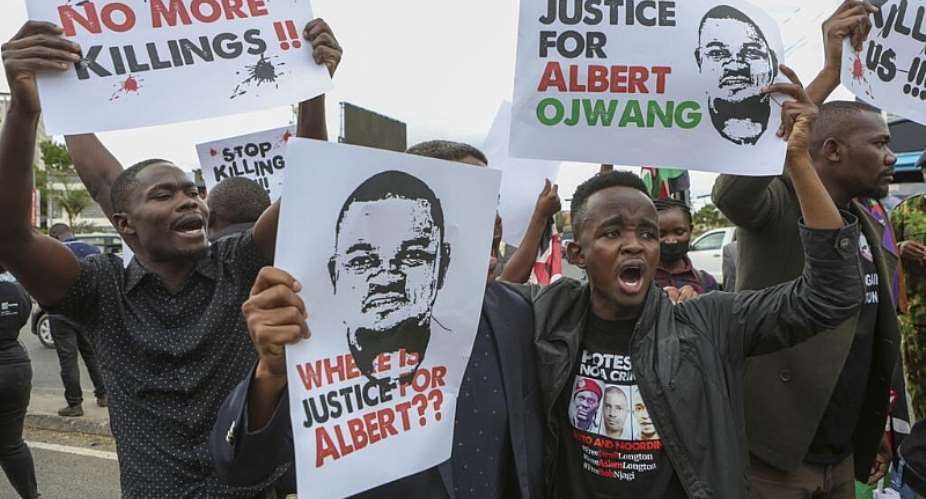Extrajudicial Killings
Kenya Grapples with Deepening Repression as Gen Z Revolt Marks One Year

Kenyans march through the streets of Nairobi demanding justice for Albert Ojwang, who died in police custody on Monday, June 9, 2025. Photo: Courtesy AP
Kenya, long seen as East Africa’s economic powerhouse, a bastion of peace, and a vital gateway to the region, is now facing an alarming rise in civic repression and human rights violations. Once hailed as a model of democratic progress, the country is now experiencing a steep decline in civil liberties. One year after the country’s youth, popularly known as Gen Z, captured global attention with nationwide protests demanding transparency, justice, and accountability, the very repression they stood up against has only grown worse.
The incident that has brought global attention back to Kenya happened on June 8, 2025. A 31-year-old teacher and blogger, Albert Ojwang, died in police custody under troubling circumstances. He had been arrested in Homa Bay, a town in western Kenya, for allegedly defaming Deputy Inspector General (DIG) Eluid Lagat on the social media platform X. He was later moved to Nairobi and died at the Central Police Station less than 12 hours after his arrest. Authorities claimed he had injured himself by hitting a wall. However, an independent autopsy showed signs of brutal torture including head trauma, neck compression, and other severe injuries.
Ojwang’s death came just weeks before the anniversary of the Gen Z protests of June 2024. His killing reignited public anger and renewed international concern over the state’s increasing crackdown on dissent. It also came just a day following the arrest of Rose Njeri, a 28-year-old tech innovator. She was detained without access to a lawyer for 88 hours for simply developing a civic tech app that allowed Kenyans to monitor and comment on the Finance Bill 2025. This bill is widely seen as representing how far removed the government is from the everyday struggles of ordinary citizens.
For many young Kenyans, these events were a painful reminder of the same frustrations that sparked last year’s uprising. In June 2024, anger over Finance Bill 2024 began online and quickly turned into a series of nationwide protests. The demonstrations reached their peak on June 25, when protesters broke into Parliament. This bold act shocked the political elite and inspired similar movements in Nigeria and Uganda. The bill had proposed taxes on essential goods like bread and diapers, which made it a symbol of a political class, disconnected from the reality most Kenyans face. The protests, organized online and driven by youth, exposed deep economic injustice and growing public frustration.
The state’s reaction to the protests was forceful. Police used live bullets on peaceful demonstrators, killing several and arresting more than 1,200 people. The Kenya National Human Rights Commission recorded at least 60 protest-related deaths. Missing Voices Kenya, a coalition that monitors police killings and forced disappearances, documented 159 such incidents in 2024 alone. This marked a 450 percent increase from previous years. Instead of addressing the protesters’ concerns, the government responded with greater repression. Peaceful dissent is now almost criminalized, and digital activism is being treated as a national security threat.
Following the breach of Parliament, President William Ruto took a series of dramatic steps aimed at easing public unrest. He withdrew the controversial finance bill, dissolved his Cabinet, and announced sweeping budget cuts. He also vowed to shut down several symbolic government offices. While these moves were seen by some as steps toward accountability, many Kenyans criticized them as reactionary, meant more to defuse public anger than to implement real, lasting reforms.
Yet tensions have only deepened. As the first anniversary of the Gen Z-led protests approaches, fresh unrest has erupted across the country in response to the death of Ojwang. Protesters are demanding justice and the arrest of DIG Lagat, who is believed to have ordered Ojwang’s detention. Although Lagat has since stepped aside, critics argue that the gesture is far from sufficient. On June 17, renewed demonstrations broke out, with protesters calling for stronger action and accountability against senior police officers. In cities like Nairobi, these protests quickly escalated, with reports of violence and targeted attacks on peaceful demonstrators. Government-linked gangs, often operating with police support, were accused of assaulting protesters. One particularly harrowing video showed a police officer shooting an unarmed street vendor at close range, a chilling moment that has since become a powerful symbol of the growing crisis of police brutality in Kenya.
Fear has become a daily reality for many Kenyans. The government's heavy-handed crackdown has created a climate where dissent carries real and dangerous consequences. Yet, despite the risks, the spirit of resistance remains unbroken. On June 25 (tomorrow), calls to once again occupy Parliament are growing louder, exactly one year after at least nine young protesters were killed in the same precinct, six by bullets and three by brutal force. As the anniversary approaches, the question remains: will history repeat itself, or will this moment mark a turning point in Kenya’s struggle for justice and accountability?
